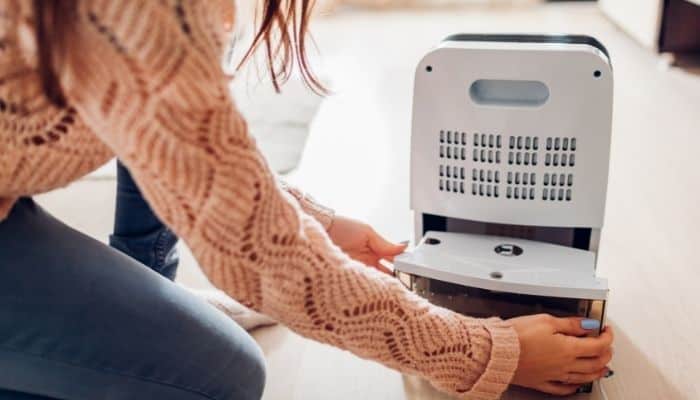Can You Plug a Dehumidifier into an Extension Cord?
Dehumidifiers can be an essential household appliance if you constantly deal with excessive moisture or humidity in your home. It removes moisture from the air, decreases humidity, and improves the air quality in your household. However, these devices range in size and width but can usually be a bit bulky, begging the common question of whether you can use an extension cord with a dehumidifier.
You should not use an extension cord with a dehumidifier, even though it’s possible. Dehumidifiers pull a lot of energy that a standard extension cord may not be able to withstand. It’s best to keep dehumidifiers plugged into a t ee-prong outlet.
Depending on the product and manufacturer’s guidelines, it may be possible to use an extension cord for a dehumidifier as a temporary solution. Still, an extension cord shouldn’t be used as a permanent solution. Keep reading to examine how to correctly utilize dehumidifiers and understand why extension cords aren’t suitable for use with dehumidifiers.
< />
Can You Use a Heavy-Duty Extension Cord With a Dehumidifier?
Every year, millions of dehumidifiers are sold across the United States. Dehumidifiers are one of the most popular additions to homes because of their ability to help make your home a more comfortable environment. Depending on the size of your humidifier and the number of electrical outlets your home may have, it can be tempting to use an extension cord to power your dehumidifier.
You can use a heavy-duty extension cord with a dehumidifier. They pull a lot of energy that a standard extension cord may not be able to support, but if the manufacturer of your particular model allows, it most likely would be okay to use a heavy-duty extension cord.
Still, it should only plan to use it as a temporary solution.
When looking for a heavy-duty cord, you’ll need to understand the types of cord and their specific purpose. While it’s tempting to find the first cord you see that’s most cost-effective, it’s essential to find a heavy-duty cord suited for your dehumidifier.
Cords are rated and labeled with the following common letters:
- S: S-rated cords are one of the most generic cords you’ll find in stores and are perfect for general functions within your home versus outdoor usage, but not for your dehumidifier.
- W: W-rated cords are a slightly higher tier than S-rated and are safe to use outdoors as they have a waterproof layer to protect them from the outdoor elements, but not for your dehumidifier.
- J: J-rated cords are higher insulated cords used for heavy-duty devices. However, J-cords will probably not have enough power for a dehumidifier.
- P: P-rated cords are also heavy-duty cords that should be a temporary use for your dehumidifier, but you should check with your product manufacturer to confirm for any usage.
< />
What Kind of Extension Cord Can I Use With a Dehumidifier?
The kind of extension cord you can use with a dehumidifier might be a heavy-duty cord as a temporary solution if your product manual allows you to do so. However, it would be best to avoid extension cords and keep them plugged into a t ee-prong circuit.
Many manufacturers recommend not using extension cords for dehumidifiers in the owner’s manuals. As mentioned prior, dehumidifiers pull a lot of energy that an extension cord may not be able to handle. Additionally, a dehumidifier changes moisture to liquid which may be a safety precaution if it ever leaks.
While a heavy-duty extension cord may be a temporary solution, you’ll need to attach your dehumidifier to a power source such as a t ee-prong outlet that’s safe and reliable. Remember not to use an extension cord if the manufacturer recommends against it.
< />
Can a Dehumidifier Be Plugged Into a Surge Protector?
Generally, dehumidifiers should only be plugged into the power source advised in the product manual. Most commonly, it’ll be a t ee-prong outlet. Now that we know that extension cords are to be avoided for dehumidifier usage, some folks may also wonder if a surge protector can be a t ee-prong outlet substitute?
Surge protectors should never be the source of power for a dehumidifier. Dehumidifiers contain a tank that gradually fills up with water. Any cords that can be found ground level can end up being a safety hazard if the dehumidifier was to ever leak to the ground.
For this reason, it’s imperative to not only not place a dehumidifier near surge protectors or extension cords, but anything that can be an electrical or fire hazard if it were to get wet.
< />
Why Do Some Appliances Say Not To Use an Extension Cord?
When you look at most appliances that require a power source, you’ll notice they advise not to utilize extension cords or use it as a temporary power source. Extension cords are a convenient way to bring power to a majority of your household devices and appliances.
Some appliances may say not to use an extension cord due to:
- Your appliance may need a permanent power source to run efficiently.
- The appliance may draw higher voltage than an extension cord can provide, making the cord a fire risk.
- Extension cords can be a hazard for heating and cooling operations.
When used without proper caution for their intended purposes, they can become fire hazards and pose significant injury or safety risks. It’s imperative always to read your appliance to ensure an extension cord is an allowed source of power for your product.
Another reason you may not want to use an extension cord with a dehumidifier is that, if it is out in the open, someone might trip over the cord.
< />
Conclusion:
Overall, connecting a dehumidifier to a power source in your home isn’t a difficult thing to do. It’s imperative to use a t ee-prong outlet to connect and operate your dehumidifier.
Using a t ee-prong outlet ensures your dehumidifier is grounded.
An extension cord or surge protector can be a considerable safety precaution for your household due to the amount of electricity pulled into the cord and excessive heat. Remember to always consult your installation instructions for the electrical requirements for the model of your dehumidifier.
Sources:
- The Humidistat: Can A Dehumidifier Be Plugged Into An Extension Cord?
- GE Appliances: Dehumidifiers Use of Extension Cord or Surge Protector
- HVAC: Dehumidifier Placement Guide – Where Should You Place Your Dehumidifier?
- StateFarm: Extension cord safety: what to do and what to avoid
- CNET: Portable dehumidifiers: Everything you need to know to buy the right one for your home
- ESFi: Extension Cord Safety Tips
- West Bends: Power strip safety tips for your family
- Statista: Total unit shipments of dehumidifiers in the U.S. from 2012 to 2019 (in millions)*
You may also be interested in… Are Tosot Dehumidifiers Good? (You Will Love The Pump Feature) and Is Pro Breeze A Good Brand For Dehumidifiers & Air Purifiers



